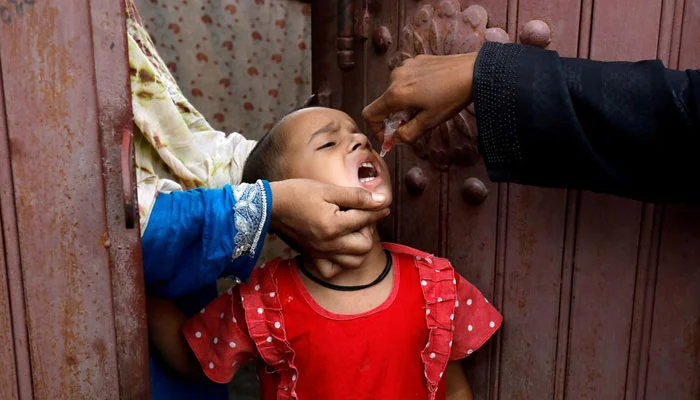ISLAMABAD The National Institute of Health Islamabad announced on Monday that around 14 environmental (sewage) samples of Type-1 Wild Poliovirus (WPV1), which were collected in October from seven places, including Karachi, had tested positive for the illness.
Three samples were taken from Peshawar, two from Hyderabad and one from Karachi’s District East; the remaining samples were taken from Karachi’s Keamari, Karachi Central, Karachi West, Sukkur, Kohat, Quetta, and Islamabad, according to The News.
Officials in Peshawar provided information, stating that the environmental sample, which is the 27th positive sample from the district Peshawar this year, was taken on December 6, 2023, from the Hayatabad 1 and 2 Tributary environmental sample collecting location.
April 10, May 9, May 16, June 5, July 4, July 17, August 1, August 17, August 22, September 5, September 12, September 20, October 4, October 5, October 23, November 6, November 7, November 20, and December 4, 2023 were the dates on which the preceding 26 positive tests were taken. The virus that was isolated belongs to the YB3A cluster and has a genetic linkage of 98.78% with the virus that was found in a polio patient in Nangarhar, Afghanistan, on May 8, 2023.
On December 6, poliovirus was also discovered at the environmental sample collection sites for Gulababad and Chungee Tributary, Yousafabad and Tajabad Tributary, and Yousabad Tributary. The virus that was isolated belongs to the YB3A cluster and has a genetic linkage of 98.67% with the virus that was found in a polio case in Nangarhar, Afghanistan.
On December 13, an environmental sample was taken in Kohat from the Faqirabad environmental sample collecting location. This is the district’s third positive sample for the year. October 20, 2023, and November 14, 2023, were the dates of collection for the first two positive samples. The virus that was isolated belongs to the YB3A cluster and is 99.89% genetically related to the virus that was found on November 13 in an environmental sample from Karachi East Gadap.
The environmental sample for Karachi East was taken on December 11 at the Machar Colony environmental sample collection site. This is District East’s twelfth positive sample for the year. On May 15, September 12, September 26, October 10, and October 12, November 13, and November 15, 2023, the preceding 11 positive tests were taken.
The virus that was isolated belongs to the YB3A cluster and is 99.4% genetically related to the virus that was found on November 15, 2023, in an environmental sample in Karachi East Gadap.
The 13th positive sample from District East this year was also discovered to have poliovirus from the Rashid Minhas environmental sample collection site. The virus that was identified belongs to the YB3A cluster and is 99.6% genetically related to the virus that was found on September 7 in an environmental sample from Karachi Central (Liaquatabad).
Additionally, poliovirus was discovered in the Muhammad Khan Colony in Karachi Keamari, the Khamiso Goth ES site in District West of Karachi, and the Haji Mureed Goth environmental sample collecting site in District Central Karachi.
Poliovirus was discovered in Hyderabad at the Maka Pumping Station site, while it was discovered in Hyderabad at the Latifabad-9 Pumping Station ES site and the Jacob Pump Station environmental sample collection site.
Poliovirus was discovered in the Railway Pul site in Quetta, and the Jhangi Syedan environmental site in Islamabad. This year’s first positive sample from Islamabad District comes from here.
99.6% of the genetic connections between the isolated virus and the virus found in an ambient sample in Peshawar on November 7, 2023, are made using the YB3A cluster classification.
With these further discoveries, Pakistan’s total for positive environmental (sewage) samples in 2023 was increased to 112. Furthermore, there were still six occurrences of human polio in Pakistan in 2023.







